
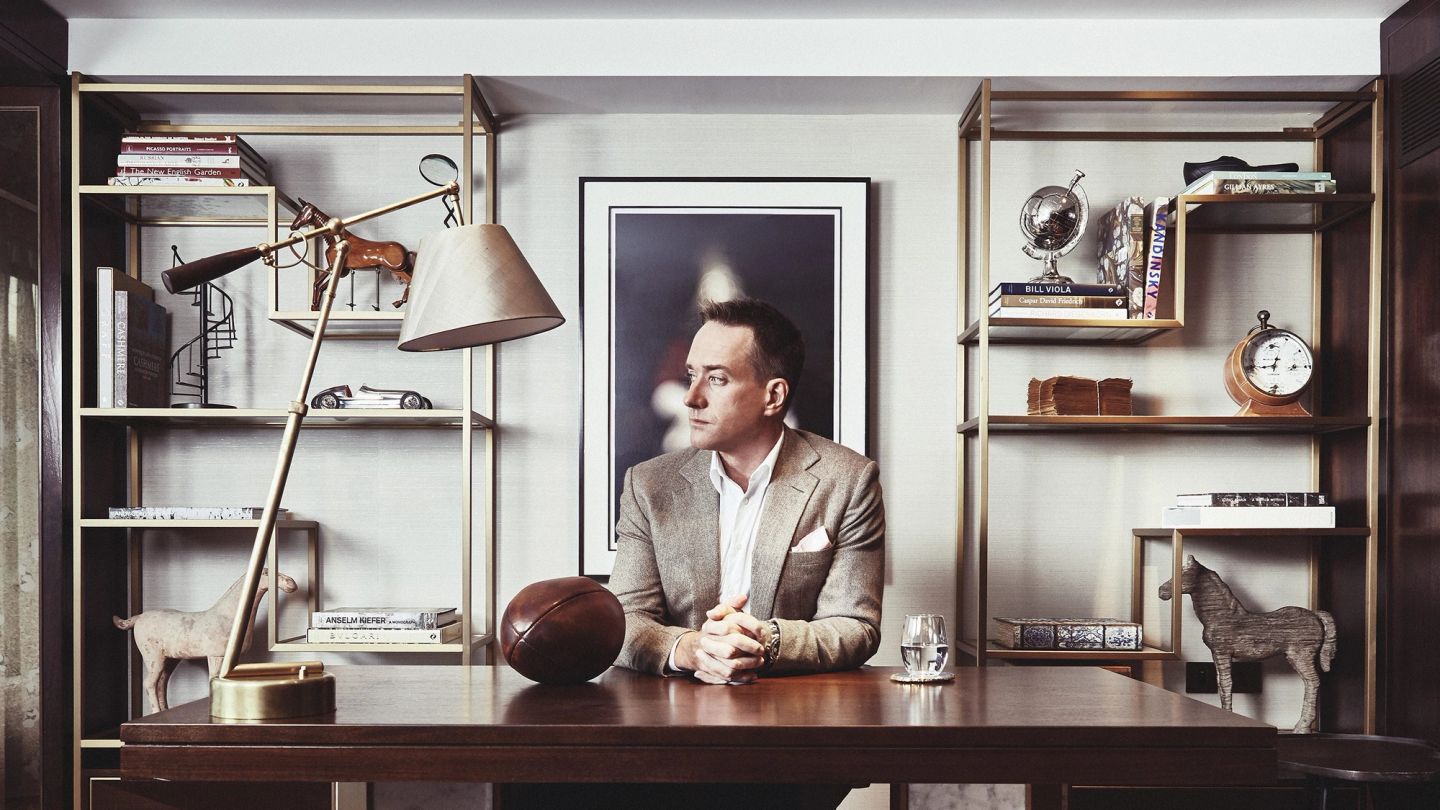
Words: Anna Galbraith
Photography: Andrew Whitton
Matthew Macfadyen is sat cross-legged on a plush velvet armchair. In the Capital Suite of the Intercontinental London Park Lane Hotel, the actor is waiting patiently as lighting equipment is adjusted and camera angles assumed. Across the room, he notices a coffee table collection of heavyweight portraiture tomes, and begins to tell a story.
In a manner wholly unpretentious and considered, Macfadyen explains that he and his wife (actress Keeley Hawes) spent a run of nights some years ago enjoying dinner at their favourite restaurant in London, The Wolseley. They had sat on a table next to a gentleman whose face was familiar, but he couldn’t place.
"These characters are ludicrous. They are ludicrous because life is ludicrous. It all is..."
Some time later, following the gentleman’s death in 2011, they discovered that their neighbour had been none other than Lucian Freud, whose work was being admired in the actor’s peripheral vision. “An incredible talent,” says Macfadyen, smiling with all the warmth of a personal friend.
This moment, long after our interview had ended — running an hour over our scheduled time for the shoot — encapsulates everything you can come to expect from Matthew over an afternoon in his company. That is to say, he is in equal measure interesting and interested. Oh — and incredibly patient.
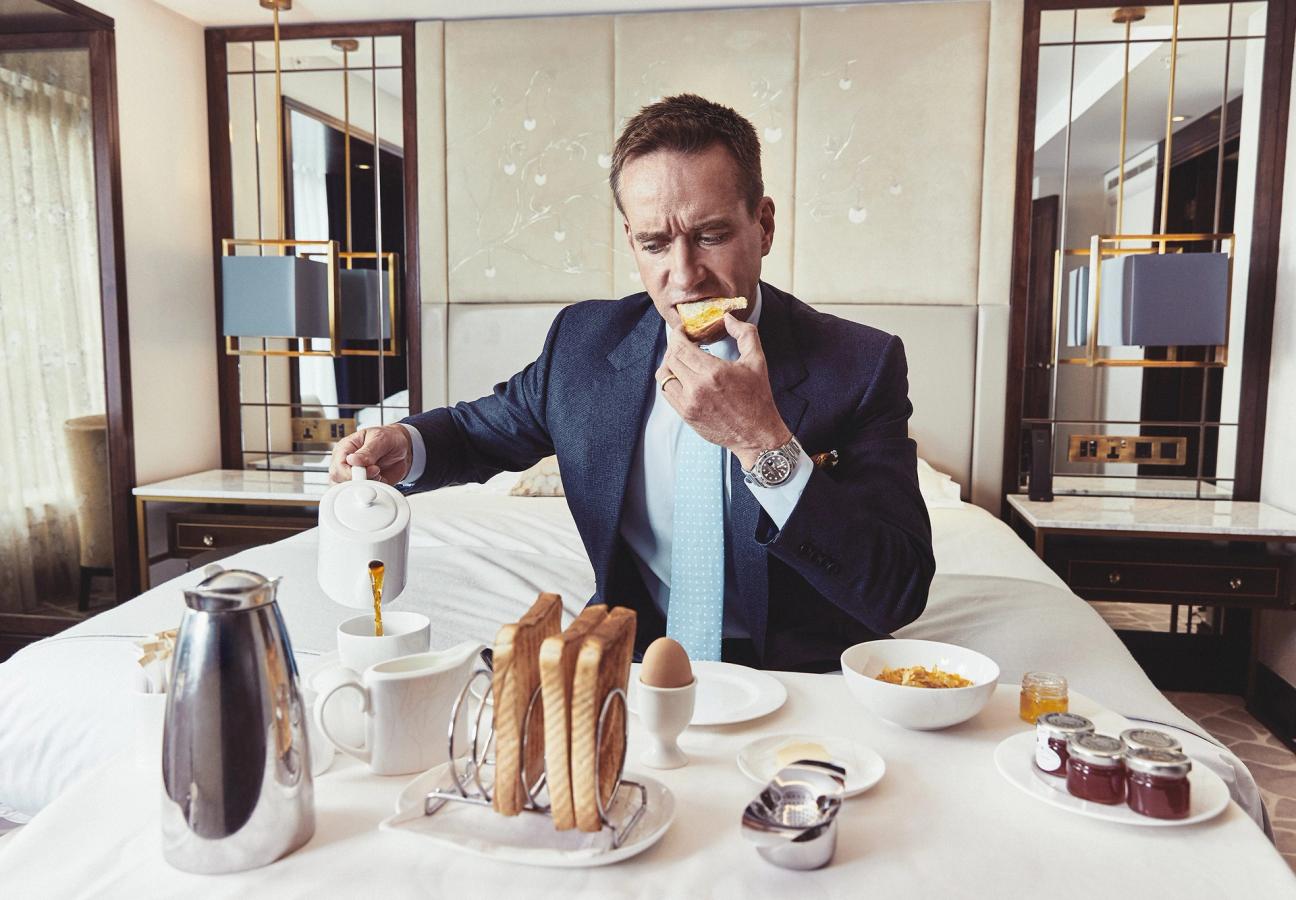
He is also, now at the age of 46, continuing to forge an enviably rich and diverse acting career, with a plethora of literature’s most iconic characters already under his belt (Austen’s Mr. Darcy, Forster’s Henry Wilcox, Shakespeare’s Benedick). And, before anyone began to consider him consigned to a resume that resembles an A Level syllabus, Macfadyen rebuked any cries of typecasting by seizing with equal vigour roles including Spooks’ Tom Quinn, John Birt in Ron Howard’s Oscar-nominated Frost/Nixon and, most recently, as the obsequious Tom Wamsgans in HBO’s juggernaut show Succession.
For Macfadyen, it is the chance to “flex different muscles” and he confesses that he’s been lucky. “I think in a funny way that you fall in love with every part you play,” he says. “Playing Tom was such fun, because it was something totally different and sort of silly.”
“I think in a funny way that you fall in love with every part you play...”
It is his “silly” role in Succession that dominates our conversation — a show which had, in turn, dominated 48 hours of my life a week earlier when I positively inhaled the full series in two sittings (the joys of boxset TV).
The handiwork of the writers behind Peep Show and the director of the Oscar-winning The Big Short, Succession is that rare gem of a show that sits firmly within the zeitgeist for crooked thriller-comedy TV (think Black Mirror), but takes us a little further by blurring the dividing line between dark drama and black humour into obscurity.
“People have been asking a lot whether it’s a comedy or a drama and I don’t think it matters. It’s a drama with a lot of jokes in it, because these characters are ludicrous. They are ludicrous because life is ludicrous. It all is,” muses Macfadyen.
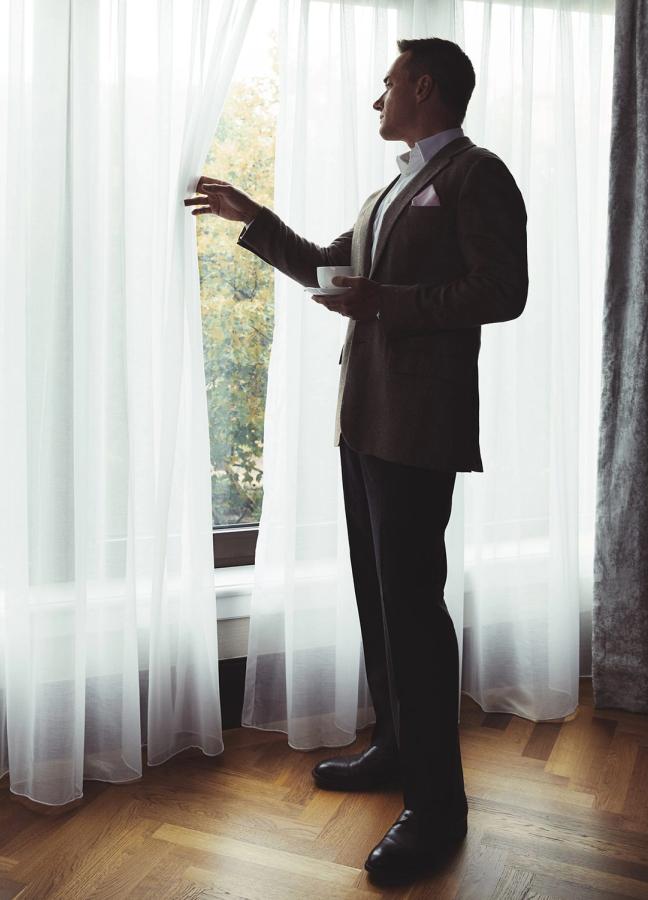
By turns tragic and hilarious, the show is, above all else relevant. It is hard to watch the show without considering the many apparent parallels to the Murdoch empire, although writer Jesse Armstrong has insisted that it has not been a direct dramatisation of the Australian media tycoon. The most blatant common denominator being that, behind all of the politics and billions of dollars, is a warring family — in this show headed by the Lear-esque Logan Roy (played with terrifying ferocity by Brian Cox).
"This script plays so well with the notion that we behave differently around different people...”
Macfadyen’s Tom is the patriarch’s potential son-in-law, who is, in one scene, incredibly sweet and doting in the company of his fiancée Siobhan (‘Shiv’, played by Sarah Snook), and suddenly completely revolting when exercising power over the loveable outsider, cousin Greg. Macfadyen responds, “But you know, people are like that. And this script plays so well with the notion that we behave differently around different people — and are able to put on different personas.”
"A traditional understanding of propriety has been discarded with the same attitude afforded to an outdated mobile phone..."
The majority of us are chastised at some point or another in our childhood with the familiar refrain ‘you would never behave this way in front of your parents’ — and yet, in Succession, this line of argument becomes redundant. Drug use, infidelity, disloyalty and unabashed selfishness are all played out before (and are perhaps even the playthings of) the father figure in this piece. Somewhere along this dysfunctional line, any traditional understanding of propriety has been discarded with the same attitude afforded by the uber-wealthy to an outdated helicopter.
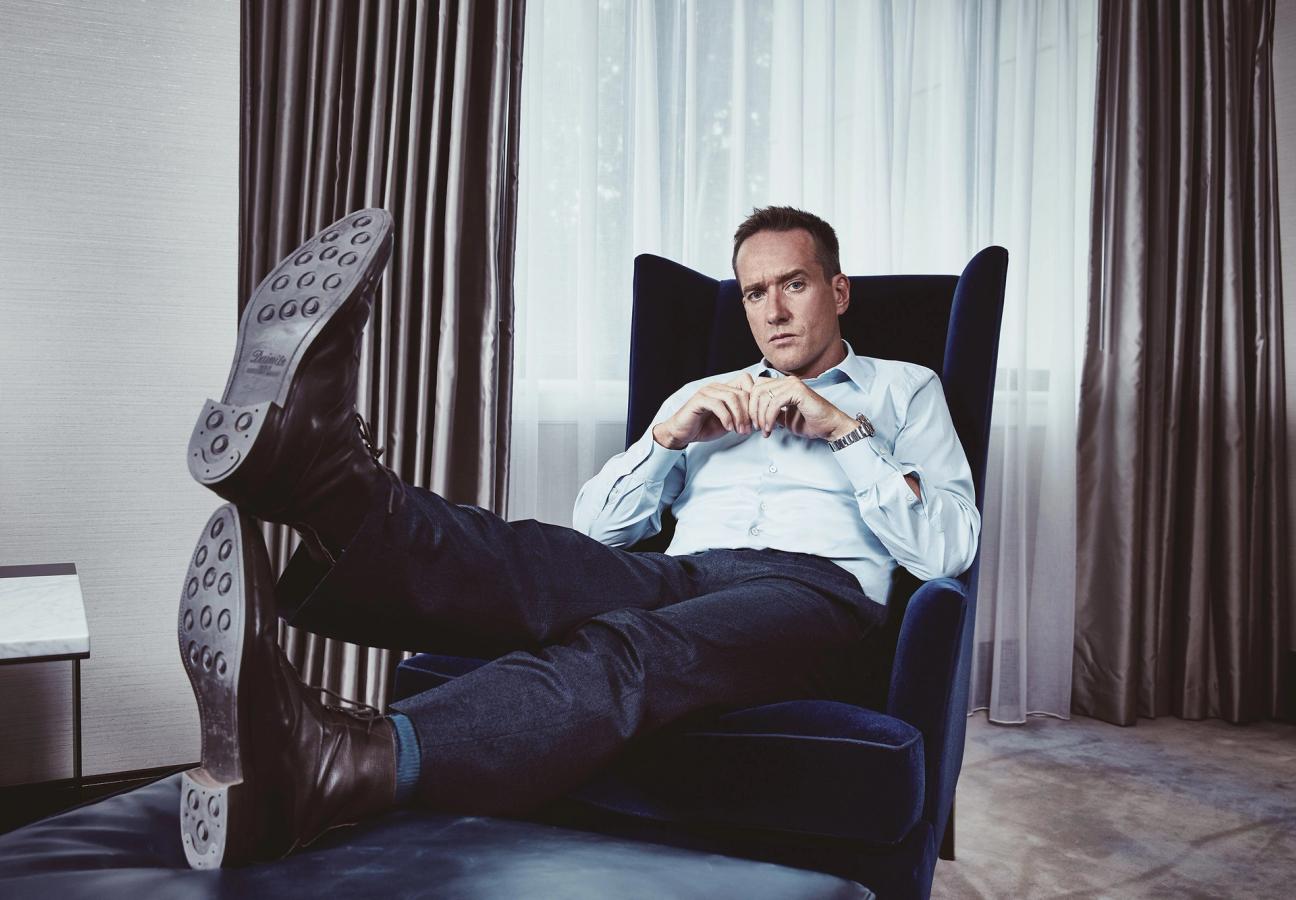
Succession is a distinctly American program, from its setting amongst the high-rises of Manhattan’s financial district, to its hallmarks to its production budget. A bold choice then for Macfadyen, whose voice has all the velvety distinction and resonance that you’d expect from a RADA alumnus, and which scored him the ultimate in quintessentially cut-glass voice-over jobs: as the narrator behind a series of Marks & Spencer food adverts.
Did he keep up the accent between filming? “I should be the kind of actor who just keeps it going, I admire it when others can, but I just can’t take myself seriously enough!”
“You think ‘I’m not dishy enough for that part, or dangerous-looking enough for this...”
The answer is typical of the self-effacing modesty which laces each of Macfadyen’s responses to any questions seeking to probe his ‘craft’. “If I was being objective about it, I wouldn’t have cast myself in a lot of the parts that I have played,” Macfadyen observes. “You think ‘well I’m not dishy enough for that part, or dangerous-looking enough for this, or you never quite match up the character. But I think that’s OK — that’s sort of as it should be.”
The conversation again returns to the theme of iconic characters in literature, of whom Macfadyen has undeniably taken on his fair share. Does he feel the pressure to match heavy audience expectation? “People are proprietorial over those characters, but actually it’s fine. And you’re one of many. People would ask me ‘aren’t you nervous to be taking on the role of Henry Wilcox, following in the footsteps of Anthony Hopkins?’ but it’s really just a treat to have a bash at it — because it’s inevitably going to be different.”
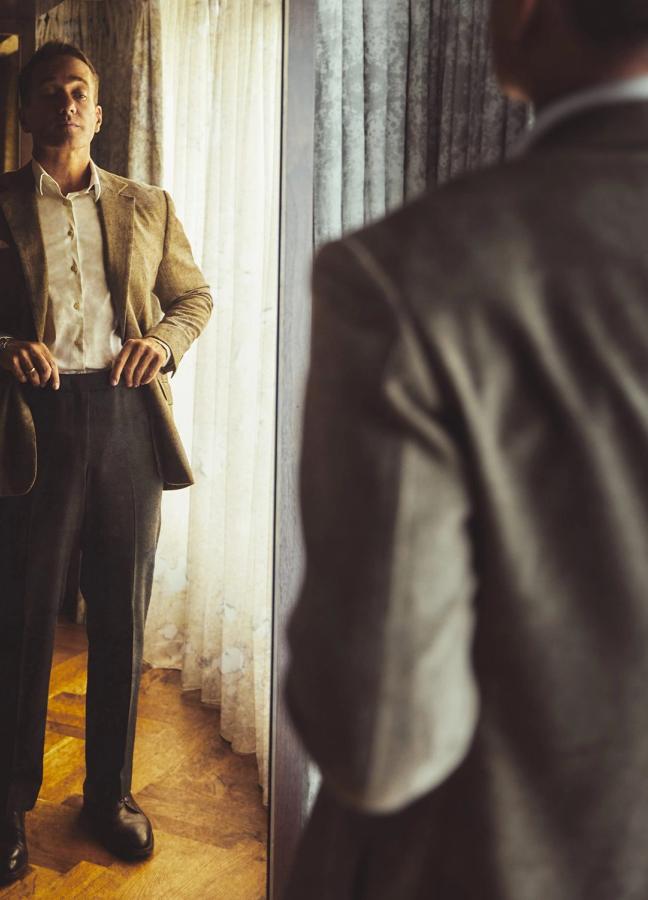
I am intrigued to know, as we talk, who of all his previous parts he considers to have been the most gentlemanly.
“Mr Darcy was a gentleman to a fault. But, something I found really interesting about Mr Wilcox was that, even though he was a terrible Edwardian patrician type, when you compare his behaviour to what we are now seeing come to light in my industry, suddenly Mr Wilcox seems an amazing gentleman. He would never dream of treating a woman in that way, and he would lie down in the road to protect someone.”
I am glad that the #MeToo climate is mentioned by Macfadyen first, and our discussion turns to the distinctions we must be able to make between what it means to be a gentleman, and a gentle man — between what we consider decent, and what is decency.
Macfadyen says, “There is social convention and all that stuff, but really it’s just about human decency. You see men behaving so terribly and wonder ‘how did you get to this place? What would your father think?’”
“There is social convention and all that stuff, but really it’s just about human decency..."
As soon as the words have left his mouth, we are both smiling with the recognition again at just how topical Succession is, in particular on the theme of learned behaviours. Jesse Armstrong’s script is peppered with the kind of phrases you want to write down and repeat to impress friends over a dinner table.
A wonderful line comes when Matthew’s character is forced to decide whether to reveal a horrific business scandal he has discovered whilst working for Logan. His first response is to tell the truth, and release what he has found into the “disinfectant of sunlight” — could there be any better description of the Weinstein revelations?
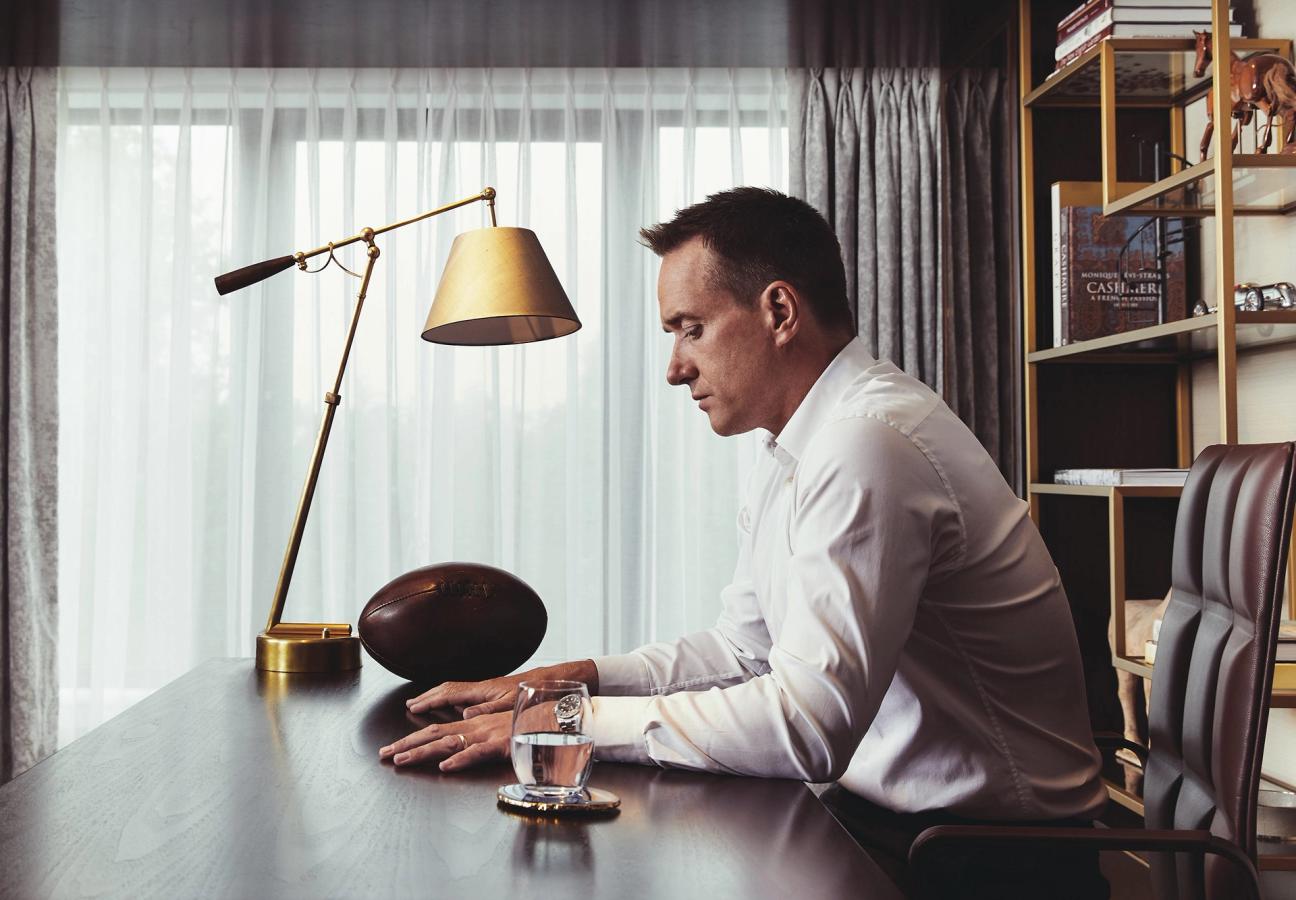
Our conversation ends with more talk of books, the novel Macfadyen has loved reading between scripts (Days Without End by Sebastian Barry), his plans to visit the cinema at the weekend with his children, and an enthusiastic discussion of his wife’s upcoming projects.
He confesses that his partner of 15 years is yet to watch Succession, but that he can expect an honest review when she does. The pride and joy that Macfadyen takes in his family is almost tangible, and he made sure to never stay away more than three weeks whilst filming in New York — “any more than that and I can feel myself getting grumpy,” he says.
A loving father, husband, delightful conversationalist and an actor whose career seems only to be gathering momentum — as Matthew Macfadyen moves through the suite to begin his shoot, I am left in no doubt that I have spent an afternoon with a powerfully gentle man.
Looking for more celebrity interviews? Read our latest cover interview with Pierce Brosnan…
Become a Gentleman’s Journal member. Find out more here.


